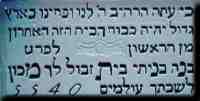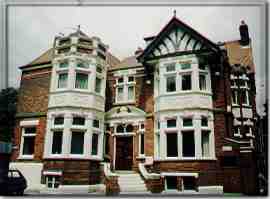
The first recorded mention of a Jewish community in Portsmouth is the purchase of the
thousand-year lease of a plot of land by Lazy Lane (now Fawcett Road) for use as a
Jews’ burial ground in December 1749. The lessees were Benjamin Levi (engraver),
Mordechai Samuel (jeweller), Lazarus Moses (chapman) and Mordechai Moses (chapman).
Fawcett Road cemetery was still in use until it became full in the early 1990s.

There is no record of any
Jews having lived in Portsmouth during the Middle Ages, though there were a scattered few
in nearby Bosham, Chichester and Southampton, and an important community in Winchester.
The first Portsmouth Jews, attracted by the opportunity of trading with the fast-growing
Royal Navy in its home port and possibly by a sense of kinship with the new
German-speaking monarchs of these isles, settled in Oyster Street in the 1730s - Jacob
Thulman signed in Hebrew in the Borough Sessions in 1736 - but soon moved out of Old
Portsmouth to Portsea, in the heart of the city’s commercial district.
There they established our first purpose-built synagogue in 1780, on the corner of Queen Street and White’s Row (now Curzon Howe Road). On the foundation stones, one of which is now set in the wall of the vestibule of the present-day synagogue, are the names of Rabbi Tevele Schiff, Chief Rabbi of the London Great Synagogue, and Hacham Moses Cohen D’Azeveda of the Spanish and Portuguese Synagogue. This reflects the important r6le that the Portsmouth community played in Anglo-Jewry at that time.
In 1763 Rabbi Hart Lyon retired from his post as Rabbi of the Great Synagogue, where he had been the undisputed leader of the Aslikenazi community of Britain. The Great invited Rabbi Tevele Schiff to be his successor; but the Hambro wanted Rabbi Meshullam Zalman. The provincial communities mirrored London and split into opposing camps. In Portsmouth the Schiffites won; and, according to the historian Cecil Roth, such was the esteem in which our community was held that their triumph tipped the balance for the whole country. Vis à vis the other provincial communities, Portsmouth Jewry reached its zenith during the economic boom of the Napoleonic wars, provisioning the Royal Navy as it rose to become the world’s greatest military force. In numbers, the community of 100 adult males (total 400—500 people) was exceeded only by London, Liverpool and Birmingham, and in 1812 the Portsmouth Jewish community was probably the most important in the provinces.
After the defeat of Napoleon, the slump
prompted many Jews to leave Portsmouth and settle in the northern manufacturing towns
powering the industrial revolution, or seek their fortune in the Empire as did so many
other Britons. The community increased again along with that of the rest of Britain during
the period of mass Jewish immigration in 1881 - 1914 occasioned by the Russian pogroms.
During the 1930s the number of Jews in Britain rose to an historic peak of 450 000, about
1000 of them living in the Portsmouth area. After World War II numbers declined again: by
1995, about 400 of Britain’s 330000 Jews lived in and around Portsmouth.

The current premises, a much extended private house called Chilcote was converted into a
synagogue in 1936. However, many of the fittings come from Queen Street (as the 1780
synagogue was known after the main entrance was repositioned there during the
refurbishment's of 1852): the stained glass, scroll bearing the Ten Commandments,
elders’ seats, lamp and rails by the Bimah, the ark itself, chandeliers, pine pews,
reader’s desk and royal coat of arms. Also noteworthy are the tapestry depictions of
the Chagall windows and tapestries in Jerusalem, presented by
Rusty Sotnick, and the new windows in memory of Geoffrey Berney RNVR, killed in action in
World War II.
In spite of our paucity of numbers, the Jewish
community has made a substantial contribution to Portsmouth’s civic life. From 1832
to 1858 the Jews campaigned for full civil rights in Britain: during all that time, the
Mayor and Corporation of Portsmouth were their constant champions. Mayor Edward Carter
petitioned Parliament to enfranchise Jews in 1836; Lord John Russell repeated the request
in 1847, and Viscount Monck, MP for Portsmouth, in 1852. Three of the 14 city councillors
in 1849 were Jews: David Levey, John Edwards and Moses Solomon. Emmanuel Emmanuel and
Abraham Leon Emmanuel (unrelated), and father and son Harry and Richard Sotnick have all
served as Lord Mayors of Portsmouth. Alderman Joseph Davidson, amongst others,
remembered the success he found in this city with generosity.
One Portsmouth Jew who found success abroad was Lewis Aria, who made his fortune in Jamaica. As well as establishing a replica of the Queen Street synagogue in Kingston, he left money to found a religious college in Portsmouth. Aria College was duly founded in 1874 and continued to train Hampshire Jews for the ministry until 1957.
Links with Israel are of course very strong. The community’s warm affection for the Israeli Navy is underpinned by the shared grief over the loss of the submarine Dakar, lost during her maiden voyage from Portsmouth harbour.
Click here to understand why the Jews of Portsmouth decided to have their own synagogue
Further reading
1. Aubrey Weinberg, ‘Portsmouth Jewry’, The Portsmouth Papers, Vol. 41,
Portsmouth City Council (1985).
2. The Transactions of the Jewish Historical Society of England.